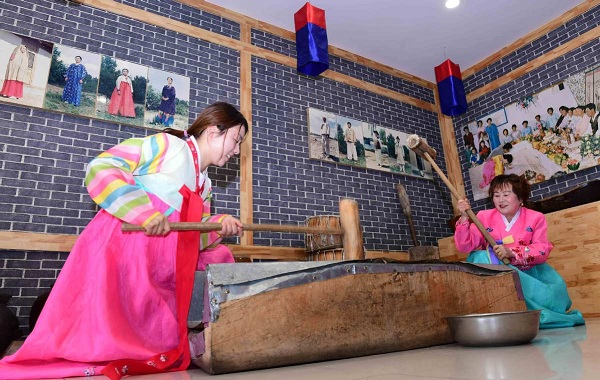Village that beat occupation and floods plans tourist boom


A villager (right) teaches a tourist how to make dagao, a traditional glutinous rice cake, in Hongqi village, an ethnic Korean settlement in Antu county, Jilin province. LIN HONG/XINHUA
An ethnic Korean settlement that was founded during World War II aims to make history once again. Cheng Si reports from Antu, Jilin province.
"When we came here in 1954, there were willows everywhere. There was no arable land in the village because the population had left as a result of extensive warfare," recalled Piao Mingchun, an 80-year-old ethnic Korean, who lives in Hongqi village, a Korean settlement in the northeastern province of Jilin.
"Responding to State appeals for land reclamation, we were part of the second batch of immigrants from Helong city in the province to clear forested land in the outlying areas.
"It was not easy at the beginning. The place was abandoned, with overgrown grass and run-down houses left by earlier generations of villagers and the Japanese army," he said, adding that there were few tools to plow the land.
"We didn't have enough cattle, so humans with iron shovels were the main workforce for planting. However, despite the laborious work, yields were pretty low."
Blood and tears
The Korean Peninsula's close proximity means the provinces of northeastern China have long been attractive to immigrants. Historically, farmers leading poor lives in the peninsula moved to neighboring territories, such as Jilin. By 1918, the number of Korean immigrants in China's northeastern provinces was 360,000, according to a statement by the Jilin government.
Hongqi, a village in Antu county, Yanbian Korean autonomous prefecture, is home to 86 households of 326 people. More than 80 percent of the residents are members of the Korean ethnic group.
"Actually, the village, previously called Tribe No 2, was founded by the Japanese army during the War of Resistance Against Japanese Aggression (1931-45)," said An Xuebin, a member of Antu's political consultative committee, who researches Chinese culture and history.
"Around 1939, the Japanese army used the area around Changbai Mountain as a military base, and forced 80 poor households from the Korean Peninsula to move to Autu and reclaim the land by planting rice. Conditions were really harsh, because the people were oppressed and short of food and clothing."
According to the county's official history, Tribe No 2 was liberated around 1945, but it struggled economically throughout the 1950s as a result of the scars left by the war. In 1958, it was renamed Hongqi Brigade, referring to the smallest administrative unit for villages, and became Hongqi village in 1985.
Piao said life never seemed to improve, no matter how hard the inhabitants worked.
"In the 1950s, five people in my family worked on the farm - my sisters and brothers, and my father - but we only had 3 jiao left at the end of the year," he said, referring to a small denomination coin.
The turnaround came in 1981, when Piao and two other villagers became the first residents to rent land from the brigade, which still administered the village.
"The land and all the crops grown on it were the collective property of the village back then, which meant the residents had little incentive to work hard. Piao was one of three villagers who took the lead to rent the land. Even after submitting a prescribed amount of produce to the brigade, they could each get more grain as long as they worked hard," said Zhao Zhefan, the village Party secretary.
Piao was excited when he recalled the contract: "My family was highly motivated after I rented 8 mu (0.5 hectares) of land from the brigade. The yield grew to 750 kilograms per mu from 600 kg in just one year, and we made a profit of 1,000 yuan that year."
The villagers began to live better lives by developing folk tourism, benefiting from the increasingly prosperous tourist industry around Changbai Mountain that started in the late 1970s.
MOST POPULAR
- 1 China to give visa-free treatment to another 9 countries
- 2 China fully opens manufacturing sector to foreign investors in landmark opening up move
- 3 China's import expo attracts record-breaking participating countries, exhibitors
- 4 China's door opening even wider to foreign visitors, businesses
- 5 China revises rules to ease foreign strategic investment in listed firms
Editors' Picks
 Video:
Peru sees new port open
Video:
Peru sees new port open
 Infographic:
China's public holidays for 2025
Infographic:
China's public holidays for 2025
 Infographic:
Basic facts of APEC
Infographic:
Basic facts of APEC
 Infographic:
Wrapping up the 7th CIIE: Data recap
Infographic:
Wrapping up the 7th CIIE: Data recap



